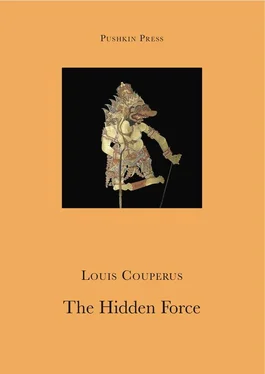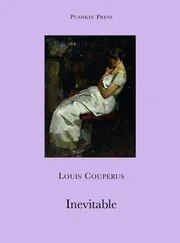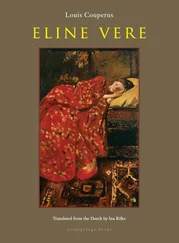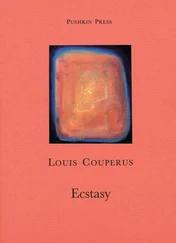Louis Couperus - The Hidden Force
Здесь есть возможность читать онлайн «Louis Couperus - The Hidden Force» весь текст электронной книги совершенно бесплатно (целиком полную версию без сокращений). В некоторых случаях можно слушать аудио, скачать через торрент в формате fb2 и присутствует краткое содержание. Год выпуска: 2012, ISBN: 2012, Издательство: Pushkin Press, Жанр: Классическая проза, на английском языке. Описание произведения, (предисловие) а так же отзывы посетителей доступны на портале библиотеки ЛибКат.
- Название:The Hidden Force
- Автор:
- Издательство:Pushkin Press
- Жанр:
- Год:2012
- ISBN:9781908968227
- Рейтинг книги:4 / 5. Голосов: 1
-
Избранное:Добавить в избранное
- Отзывы:
-
Ваша оценка:
- 80
- 1
- 2
- 3
- 4
- 5
The Hidden Force: краткое содержание, описание и аннотация
Предлагаем к чтению аннотацию, описание, краткое содержание или предисловие (зависит от того, что написал сам автор книги «The Hidden Force»). Если вы не нашли необходимую информацию о книге — напишите в комментариях, мы постараемся отыскать её.
The Hidden Force — читать онлайн бесплатно полную книгу (весь текст) целиком
Ниже представлен текст книги, разбитый по страницам. Система сохранения места последней прочитанной страницы, позволяет с удобством читать онлайн бесплатно книгу «The Hidden Force», без необходимости каждый раз заново искать на чём Вы остановились. Поставьте закладку, и сможете в любой момент перейти на страницу, на которой закончили чтение.
Интервал:
Закладка:
The Hidden Force opens an interesting and fresh angle on the idea of Orientalism. For Couperus made use of all the symbols that became the clichés of East and West, which Edward Said has identified with colonial apologetics: the East representing the passive female principle (the moon), and the West the vitality of the sun; the West being modern, rational, logical, industrious, creative, idealistic, and the East mysterious, mystical, torpid, sensual, irrational. And so on. But far from using these images of Occident and Orient to justify colonialism, Couperus shows the futility of European rule. For the hidden force of the East will vanquish the West, with all its rational pretensions.
More than that, The Hidden Force suggests that it is desirable that the East should do so. Van Oudijck’s spiritual defeat is also a small triumph of enlightenment. He loses the attributes that made him into the perfect Dutch administrator, to be sure. Where he had been stern and decisive before, “now he developed a tendency to pour oil in troubled waters, to make excuses, no longer to be so unbending and severe, and to blur and tone down everything that was black and white”. His vitality is gone. His skin turns sallow. In short, he shows the danger-signs of giving in to the torpor of the East, of “going native”. This happens, quite literally, at the end of the book, when Eva Eldersma, the artistic Dutch woman, goes to say goodbye to him before leaving for Europe — she, too, has been defeated; she will never come back. She finds Van Oudijck living in a native village, or kampong , in a situation that is “all very Indies”. He has found a kind of happiness there, living with a native woman and her extended family. He has lost his principles, but he has gained an insight, for his principles no longer blind him to reality. He has accepted the Indies for what it is.
The European dread of going native, which Couperus describes so beautifully, was a fear on two fronts: a political and a sexual one. Both are, of course, linked. We laugh now at the image of Englishmen and Dutchmen in the jungle or the bush, dressing up for formal dinners in the tropical heat. But there was a real purpose to this. For the stiff suit was one of the necessary caste marks to impress their subjects, as well as themselves, of the Europeans’ natural right to rule. Letting go of European proprieties, or “principles”, was a step towards letting go of power. In colonial households (Eva Eldersma’s for instance), it “was always a battle, not to go under in the temptation to let yourself go, to let the grounds that were too big become overgrown…” When Eva’s husband is too hot and tired to dress for dinner in a black jacket and stiff collar, she “found it dreadful, unspeakably awful…”
No wonder the Europeans felt horribly humiliated when, dressed in rags, they were forced to bow to Japanese guards in Second World War concentration camps. The Japanese knew perfectly well what they were doing. Like the black slaves in Trinidad, they turned everything upside down, except that this was for real. As the Dutch writer Rudy Kousbroek, himself a former prisoner of the Japanese, has pointed out, the most common expression among the Dutch survivors was: “We were treated like coolies”—that is to say, much like the way the Dutch treated many of their colonial subjects.
Then there was the sex. People forget what a sexual, even sexy enterprise colonialism was. And I don’t mean just metaphorically, in the sense of the virile West penetrating the passive, feminine East. (The idea, by the way, of Asia as the temple of Venus, and all her temptations, is as old as the ancient Greeks.) Colonial life was quite literally drenched in sex. White men would enter the kampongs and take their pleasure with native girls for a few coins, or even for nothing, if the men were cheap and caddish enough. Europeans enjoyed the droit de seigneur in the kampong , and anyway, native women and half-castes were supposed to be unusually highly sexed. They still had this reputation when Eurasians moved to Holland in the 1940s and 1950s, usually to settle in The Hague, where I grew up. Girls of Indonesian or mixed-race extraction at my school were all supposed to be “hot”. And the languid boredom of colonial life encouraged endless wife-swapping affairs among the Europeans as well.
Casual tropical sex is personified in The Hidden Force by Léonie, the District Commissioner’s wife, and her Indo lover, Addy de Luce. Both live for seduction. Neither of them has anything but sex on the brain. They are born voluptuaries. Léonie loves Addy. Indeed every woman and girl loves him, with “his handsome, slim, animal quality and the glow of his seducer’s eyes in the shadowy brown of his young Moor’s face, the curling swell of his lips, made just for kissing, with the young down of his moustache; the tigerish strength and suppleness of his Don Juan’s limbs…”
The European fear of letting go, of being “corrupted”, of going native, was to a large extent, I suspect, the northern puritan’s fear of his (or her) own sexuality. If Couperus had shared this fear, his book would have been another Victorian morality tale. But he is not a puritan at all. He doesn’t judge his characters harshly, not even the voracious hare-brain Léonie. Indeed, one feels that he himself would have fancied Addy. A dandy, a homosexual, and a Romantic, Couperus understood the sensuality of colonial life perfectly. He was attracted to the sun — in the Mediterranean, as well as in the East — for just that reason. He cultivated the image of torrid indolence. His rooms in Europe would be heated to a tropical temperature, as though he were an orchid, and he pretended to spend most of his time dreaming. In truth, of course, like Noel Coward, who affected a similar pose, he worked very hard. But with his carefully tended, over-refined sensibility he might have seemed more in sympathy with Sunario, the “degenerate[…] Javanese”, than with Van Oudijck.
Couperus’s readings from his work were legendary. He would complain if the flowers on stage weren’t exactly right. He did not read his prose so much as declaim it, in his high-pitched theatrical voice, like a male Sarah Bernhardt. My grandmother once attended one of these performances in a provincial Dutch town. She remembered how Couperus not only had the flower arrangement changed after the intermission, but how he had changed his socks and tie to ones of a slightly different shade of grey.
And yet Couperus, however rarefied his tastes, did not try to identify himself with the Javanese. He was born in the Dutch East Indies, where his father was a colonial official, but he remained completely European. He describes Sunario from the same ironic distance as he does Van Oudijck. If Couperus felt close to any group in particular it was with those who were neither one thing nor the other: the Eurasians. Both Van Oudijck and Sunario are pure in their ways, the principled, full-blooded Dutchman, or totok , and the refined, pure-blooded Javanese; and that, in Couperus’s eyes, was precisely what was wrong with them. For Couperus celebrated the ambiguity he himself personified: a Dutchman born in the Indies, a homosexual who was married to a devoted wife, a master of the Dutch language but an exotic outsider in Holland—“an orchid among onions” as one of his obituarists called him.
The only characters in The Hidden Force who are entirely at ease with themselves, despite their European pretensions, are the Indos: Addy and his extended family, or Van Oudijck’s daughter, Doddy. They appear to have the best of both worlds. But I suspect this is more a reflection of Couperus’s sympathies than real life. For in fact the Eurasians probably had the worst of all worlds. They were legally Europeans, but they ranked low in a society obsessed by race and colour. Some hardly spoke Dutch; others, like Van Helderen, who prophesied the native rebellion, spoke it almost too precisely. Like Van Oudijck, most totoks respected the Javanese as a civilized race, perhaps more civilized in their way than the Europeans, but despised the Indos. They were commonly regarded by the Dutch as lazy and stupid, as well as oversexed. People made fun of their efforts to speak proper Dutch. Even Couperus has some fun with this — something that tends to be lost in translation. The Indos overcompensated by disdaining the natives, as though this would make the Dutch accept them as equals. In fact, of course, it just made them seem more despicable. Rudy Kousbroek, who has written brilliantly about this extraordinary social geography, described his native Dutch East Indies thus:
Читать дальшеИнтервал:
Закладка:
Похожие книги на «The Hidden Force»
Представляем Вашему вниманию похожие книги на «The Hidden Force» списком для выбора. Мы отобрали схожую по названию и смыслу литературу в надежде предоставить читателям больше вариантов отыскать новые, интересные, ещё непрочитанные произведения.
Обсуждение, отзывы о книге «The Hidden Force» и просто собственные мнения читателей. Оставьте ваши комментарии, напишите, что Вы думаете о произведении, его смысле или главных героях. Укажите что конкретно понравилось, а что нет, и почему Вы так считаете.












